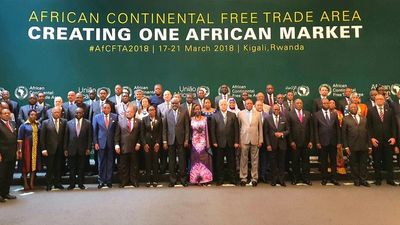44 African Countries Signed The Continental Free Trade Agreement, Here Are The Ones That Didn't
Africa's two biggest economies, South Africa and Nigeria, withheld from signing the agreement to establish The African Continental Free Trade Area.
The African Union (AU), reached new heights for its Agenda 2063 project in its recent summit where 44 African countries united to sign an agreement to establish The African Continental Free Trade Area (AfCFTA) in Kigali, Rwanda.
Two of Africa's largest economies, South Africa and Nigeria, withheld their signatures from the AfCFTA, along with nine other member countries. This agreement marks a new, important chapter of the AU's project 2063, which is an outline to transform Africa's socio-economy over the next 50 years. Although, the absence of signatures did not completely halt AfCFTA's establishment, it certainly hurts the image and uniting agenda of the African Union.
Without the signature of all 55 member countries, the AU will fall short in having established the largest trade agreement, by a bloc of 55 member states, in the world.
The goal of the agreement was to improve intra-regional trade throughout the continent with hopes to decrease Africa's poverty rate and grow its manufacturing base by ridding the continent of all trade barriers, including "non-tariff barriers and removing import duties", as reported on CNN. Yet, in his statement, South Africa's president, Ramaphosa, did not want to commit to the agreement until all of legal processes have taken place and passed through South Africa's "stakeholders and Parliament." On the contrary, Nigeria's president, Buhari believes the agreement needs further discussion altogether, and seems to be in more of a disagreement with the entire establishment. As he's stated on his twitter account:
Apart from Nigeria and South Africa, the other countries that did not sign the agreement were Botswana, Lesotho, Namibia, Zambia, Burundi, Eritrea, Benin, Sierra Leone and Guinea Bissau.
In the end, what is most important is that Africa as a continent continues to come together to reach middle ground, putting its people first and foremost. Hopefully, within the next two weeks the African Union will continue to move forward in growing Africa's social-economy, and continue to do what's best for its people.
